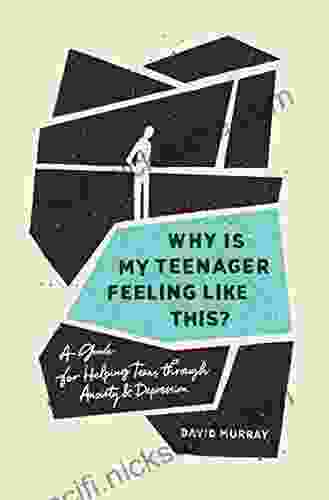Why Is My Teenager Feeling Like This? Exploring the Emotional Rollercoaster of Adolescence


The transition from childhood to adulthood, known as adolescence, is a time of immense physical, emotional, and social growth. Along with these changes come a wide range of complex emotions that can be both exhilarating and bewildering for teenagers. Parents often find themselves struggling to understand why their once-carefree children are suddenly experiencing such a rollercoaster of emotions. In this comprehensive article, we will delve into the multifaceted world of teenage emotions, exploring the contributing factors, common challenges, and strategies for parents to support their teenagers through this turbulent time.
4.5 out of 5
| Language | : | English |
| File size | : | 856 KB |
| Text-to-Speech | : | Enabled |
| Screen Reader | : | Supported |
| Enhanced typesetting | : | Enabled |
| Word Wise | : | Enabled |
| Print length | : | 162 pages |
| Lending | : | Enabled |
Hormonal Changes: A Catalyst for Emotional Fluctuations
One of the most significant factors influencing teenage emotions is the surge of hormones that occurs during puberty. These hormones, primarily estrogen in girls and testosterone in boys, play a crucial role in physical development but also have a profound impact on emotional regulation. The sudden increase in hormones can lead to mood swings, irritability, and intense feelings of joy or sadness that seem to come out of nowhere.
Identity Formation: Searching for a Sense of Self
Adolescence is a time of significant identity formation, as teenagers grapple with who they are and who they want to become. They begin to develop their own values, beliefs, and interests, which can lead to conflicts with parents and peers. The search for identity can also trigger feelings of anxiety, self-doubt, and a sense of being lost or directionless.
Social Pressures: The Impact of Peer Groups
Social interactions play a pivotal role in shaping teenage emotions. Peer groups become increasingly influential, and teenagers may feel pressured to conform to certain behaviors or beliefs to fit in. The desire for acceptance and validation can lead to feelings of stress, anxiety, and self-consciousness. Additionally, the use of social media can amplify these pressures, creating a constant stream of comparisons and judgments.
Academic Expectations: The Weight of Achievement
Academic expectations can be another significant source of stress for teenagers. The pressure to excel in school, combined with the fear of failure, can lead to feelings of anxiety, self-doubt, and inadequacy. The constant demand for high grades and accomplishments can create a sense of overwhelm and make teenagers feel like they are not living up to expectations.
Mental Health Challenges: Navigating Emotional Distress
While many teenagers experience emotional ups and downs, some may struggle with more severe mental health challenges. Conditions such as depression, anxiety disorders, and eating disorders can manifest during adolescence, causing significant distress and impairing daily functioning. It is crucial for parents to be aware of the signs and symptoms of mental health issues and to seek professional help if necessary.
Supporting Teenage Emotions: A Parental Guide
Understanding the factors contributing to teenage emotions is the first step towards supporting teenagers through this challenging time. Here are some practical strategies for parents:
1. Provide a Safe and Supportive Environment:
Create a home environment where teenagers feel safe and loved unconditionally. Listen to their concerns without judgment, validate their feelings, and let them know that you are there for them no matter what.
2. Encourage Open Communication:
Establish an open and honest dialogue with your teenager. Encourage them to talk about their feelings, both good and bad. Avoid dismissing their concerns or trying to fix their problems. Instead, listen attentively and try to understand their perspective.
3. Set Clear Boundaries and Expectations:
While it is important to provide a supportive environment, it is also essential to set clear boundaries and expectations. This helps teenagers develop a sense of responsibility and self-control. Discuss rules and consequences together and ensure that they are age-appropriate and fair.
4. Foster a Growth Mindset:
Help your teenager develop a growth mindset by focusing on effort and improvement rather than perfection. Encourage them to learn from their mistakes and to see challenges as opportunities for growth. This can help reduce anxiety and self-doubt.
5. Encourage Healthy Coping Mechanisms:
Teach your teenager healthy coping mechanisms for managing stress and emotions. Encourage them to engage in activities they enjoy, such as sports, hobbies, or spending time with friends. Exercise, mindfulness, and spending time in nature can also be beneficial for emotional regulation.
6. Seek Professional Help When Needed:
If your teenager is struggling with persistent emotional distress or behavioral changes, do not hesitate to seek professional help. A therapist can provide a safe and confidential space for your teenager to explore their emotions and develop coping strategies.
The emotional rollercoaster of adolescence can be a challenging time for both teenagers and their parents. By understanding the contributing factors, common challenges, and support strategies, parents can help their teenagers navigate this turbulent journey. Providing a safe and supportive environment, fostering open communication, setting boundaries, encouraging a growth mindset, teaching healthy coping mechanisms, and seeking professional help when needed can make a significant difference in the emotional well-being of teenagers. Remember that every teenager is different, so it is important to tailor your approach to their individual needs. By working together, parents and teenagers can create a strong and supportive bond that will help them weather the storms and celebrate the triumphs of adolescence.
4.5 out of 5
| Language | : | English |
| File size | : | 856 KB |
| Text-to-Speech | : | Enabled |
| Screen Reader | : | Supported |
| Enhanced typesetting | : | Enabled |
| Word Wise | : | Enabled |
| Print length | : | 162 pages |
| Lending | : | Enabled |
Do you want to contribute by writing guest posts on this blog?
Please contact us and send us a resume of previous articles that you have written.
 Fiction
Fiction Non Fiction
Non Fiction Romance
Romance Mystery
Mystery Thriller
Thriller SciFi
SciFi Fantasy
Fantasy Horror
Horror Biography
Biography Selfhelp
Selfhelp Business
Business History
History Classics
Classics Poetry
Poetry Childrens
Childrens Young Adult
Young Adult Educational
Educational Cooking
Cooking Travel
Travel Lifestyle
Lifestyle Spirituality
Spirituality Health
Health Fitness
Fitness Technology
Technology Science
Science Arts
Arts Crafts
Crafts DIY
DIY Gardening
Gardening Petcare
Petcare Doris Pilkington
Doris Pilkington Raghuram Rajan
Raghuram Rajan Karen George
Karen George Carol A Dahir
Carol A Dahir Peter Ralston
Peter Ralston David Christian
David Christian David Mayer
David Mayer S Connolly
S Connolly Lyn Millner
Lyn Millner Blessing Agunloye
Blessing Agunloye Cecilia Chrapkowska
Cecilia Chrapkowska Tom Mccoy
Tom Mccoy Barry Lewis
Barry Lewis Joe Hendershott
Joe Hendershott David Wescott
David Wescott Carrie Rogers Whitehead
Carrie Rogers Whitehead Michael Inden
Michael Inden Jakub Marian
Jakub Marian Bill Nason
Bill Nason Jerry A Coyne
Jerry A Coyne Michelle Garnett
Michelle Garnett Matt Davids
Matt Davids Brad Walker
Brad Walker Linda Fairley
Linda Fairley Steve Leonard
Steve Leonard Janet Evanovich
Janet Evanovich Robert Young Pelton
Robert Young Pelton Jodi Magness
Jodi Magness Stuart Firestein
Stuart Firestein Gao Yisheng
Gao Yisheng Bob Forman
Bob Forman Ed Palattella
Ed Palattella Daniel Kahneman
Daniel Kahneman Kim Heldman
Kim Heldman Elizabeth Hay
Elizabeth Hay Fiona Danks
Fiona Danks Zach Alexander
Zach Alexander Pedro Urvi
Pedro Urvi James Atkinson
James Atkinson Carol Mccloud
Carol Mccloud Leo Baker
Leo Baker Connecticut Forest And Park Association
Connecticut Forest And Park Association Fodor S Travel Guides
Fodor S Travel Guides Eric R Dodge
Eric R Dodge Phillip Stephen Schulz
Phillip Stephen Schulz Christian Smith
Christian Smith Matt Harrison
Matt Harrison Hugh Marriott
Hugh Marriott Bob Harig
Bob Harig Mathew Tekulsky
Mathew Tekulsky Su Ad Abdul Khabeer
Su Ad Abdul Khabeer Megan Miller
Megan Miller Nando Parrado
Nando Parrado Sergey K Aityan
Sergey K Aityan Aaron Oster
Aaron Oster Robert T Kiyosaki
Robert T Kiyosaki Christopher Setterlund
Christopher Setterlund Dr Barbara Sorrels
Dr Barbara Sorrels Art Smith
Art Smith Daphne Adler
Daphne Adler Curt Sampson
Curt Sampson Peter N Peregrine
Peter N Peregrine Nick Muxlow
Nick Muxlow Mantak Chia
Mantak Chia Sifu Slim
Sifu Slim John Gierach
John Gierach Jorge Croda
Jorge Croda David Franklin
David Franklin Laura J Snyder
Laura J Snyder Mahzarin R Banaji
Mahzarin R Banaji Tobias Macey
Tobias Macey Nancy H Diepenbrock
Nancy H Diepenbrock Raymond Barrett
Raymond Barrett Ron Woldoff
Ron Woldoff Jeff Carreira
Jeff Carreira L Waxy Gregoire
L Waxy Gregoire James Mcmullan
James Mcmullan Rinoa
Rinoa Bob Motley
Bob Motley Logan Thompson
Logan Thompson Kayvan Shokrollahi
Kayvan Shokrollahi Lianna Marie
Lianna Marie Brittany Noelle
Brittany Noelle Detlev Piltz
Detlev Piltz Julia Englund Strait Phd
Julia Englund Strait Phd Sharon M Ravitch
Sharon M Ravitch Lynn Rosen
Lynn Rosen Monica Gribben
Monica Gribben William Pitts
William Pitts Lewis Smile
Lewis Smile Gordon H Chang
Gordon H Chang Martin Toms
Martin Toms Jill Krause
Jill Krause Julie Kratz
Julie Kratz Michael Loynd
Michael Loynd Language Guru
Language Guru Holly Black
Holly Black Randall M Rueff
Randall M Rueff Tim Swanwick
Tim Swanwick Asaf Rozanes
Asaf Rozanes Sandra Brown
Sandra Brown Nicholas Bjorn
Nicholas Bjorn Roland Nyns
Roland Nyns Jacob Paul Patchen
Jacob Paul Patchen Paul Bellow
Paul Bellow Ed Viesturs
Ed Viesturs Fr Vincent Lampert
Fr Vincent Lampert Jennifer Pastiloff
Jennifer Pastiloff Cal Pater
Cal Pater Diane Ravitch
Diane Ravitch Jonathan Howard Md
Jonathan Howard Md Angela Stevens
Angela Stevens Mark Rashid
Mark Rashid Bradley Mayhew
Bradley Mayhew Tiffany Loggins Psyd
Tiffany Loggins Psyd Elizabeth Bishop
Elizabeth Bishop Tania Marshall
Tania Marshall Scarlett Thomas
Scarlett Thomas Patrisia Gonzales
Patrisia Gonzales J M Hofer
J M Hofer Karen Ehman
Karen Ehman Scott Waldie
Scott Waldie Julietta Suzuki
Julietta Suzuki Peter Mcdougall
Peter Mcdougall Michael Conway
Michael Conway Cheryl Marlene
Cheryl Marlene Jayne Storey
Jayne Storey Sherman Alexie
Sherman Alexie Immigration Consult
Immigration Consult Brendan Donley
Brendan Donley Karen Gershowitz
Karen Gershowitz Tom Bisio
Tom Bisio Rob Walker
Rob Walker Dr Aviva Legatt
Dr Aviva Legatt National Fastpitch Coaches Association
National Fastpitch Coaches Association James Kaiser
James Kaiser Jeannie Tyrrell
Jeannie Tyrrell Emma Fick
Emma Fick Silvan S Schweber
Silvan S Schweber Bob Thomas
Bob Thomas Sacha Koborsi Tadros
Sacha Koborsi Tadros Peter Byrne
Peter Byrne Diondre Mompoint
Diondre Mompoint Borja Loma Barrie
Borja Loma Barrie Tom Billinge
Tom Billinge Bruce Sutherland
Bruce Sutherland Carlo Zen
Carlo Zen William Shakespeare
William Shakespeare Jason Thalken
Jason Thalken Lieven Vandenberghe
Lieven Vandenberghe David Murray
David Murray Jody Hedlund
Jody Hedlund Sylvia Mercedes
Sylvia Mercedes Breann Blehm
Breann Blehm Sevki Kuruoglu
Sevki Kuruoglu Lori Foster
Lori Foster Malcolm Williams
Malcolm Williams Taste Of Home
Taste Of Home Scott Wilson
Scott Wilson Katherine A Dettwyler
Katherine A Dettwyler Mike Evans
Mike Evans Jacqueline Kelleher
Jacqueline Kelleher Nate Schweber
Nate Schweber Tehlor Kay Mejia
Tehlor Kay Mejia John Mccollister
John Mccollister Bob Gaines
Bob Gaines Xiran Jay Zhao
Xiran Jay Zhao Gregg Michaelsen
Gregg Michaelsen Nurse Academy
Nurse Academy Theodore Dalrymple
Theodore Dalrymple Dan Wowak
Dan Wowak Frank Giampaolo
Frank Giampaolo Kenneth C Roebuck
Kenneth C Roebuck Lewis Morris
Lewis Morris Paul Orland
Paul Orland James Morgan Ayres
James Morgan Ayres Richard Bach
Richard Bach Eduardo Montano
Eduardo Montano Sam Dogra
Sam Dogra Lou Kasischke
Lou Kasischke Kindle Edition
Kindle Edition Brian Zepka
Brian Zepka Maggie Smith
Maggie Smith Bill Nowlin
Bill Nowlin Becca Anderson
Becca Anderson Rachel Burgess
Rachel Burgess Mami Wata
Mami Wata Charles Johnson
Charles Johnson Elena Kryuchkova
Elena Kryuchkova Charmaine Mckissock
Charmaine Mckissock David L Cook
David L Cook Paddy Ashdown
Paddy Ashdown Sian O Gorman
Sian O Gorman 1st Ed 2020 Edition Kindle Edition
1st Ed 2020 Edition Kindle Edition Tracy Moore
Tracy Moore Lowell Skoog
Lowell Skoog Peter Nabokov
Peter Nabokov Grace Elizabeth Hale
Grace Elizabeth Hale N L Mclaughlin
N L Mclaughlin Jane Adams
Jane Adams Jack Henderson
Jack Henderson Richard J Foster
Richard J Foster Shaana Berman
Shaana Berman Norm Flayderman
Norm Flayderman John Horgan
John Horgan Zecharia Sitchin
Zecharia Sitchin Karen Le Billon
Karen Le Billon Diane Sticks Harsha
Diane Sticks Harsha Terry Mcmillan
Terry Mcmillan Christine Lion
Christine Lion Wendy Suzuki
Wendy Suzuki Terri Jean
Terri Jean Marc P Steinberg
Marc P Steinberg Lewis Howes
Lewis Howes Stephanie J Scott
Stephanie J Scott Leah Hager Cohen
Leah Hager Cohen Priscilla T Brown
Priscilla T Brown Zola Levitt
Zola Levitt Melissa Marr
Melissa Marr George G Morgan
George G Morgan Kevin Williams
Kevin Williams Donald Hanley
Donald Hanley Matthew Cronin
Matthew Cronin Larry Pardey
Larry Pardey Michael Kodas
Michael Kodas Jane Watkins
Jane Watkins Robert Farris Thompson
Robert Farris Thompson Marc Silver
Marc Silver James Lovegrove
James Lovegrove Lily Field
Lily Field John Andrisani
John Andrisani Ronald D Mcelroy
Ronald D Mcelroy Nikki Glandon
Nikki Glandon Charles Hooton
Charles Hooton Staff Of The Harvard Crimson
Staff Of The Harvard Crimson Jared Hargrave
Jared Hargrave Alan Pearce
Alan Pearce Deirdre A Scaggs
Deirdre A Scaggs Jennifer Niven
Jennifer Niven 1st Ed 2021 Edition Kindle Edition
1st Ed 2021 Edition Kindle Edition Summer Batte
Summer Batte Robin Moore
Robin Moore Corinne Brown
Corinne Brown Tom Stienstra
Tom Stienstra Philip Slayton
Philip Slayton Joseph Campbell
Joseph Campbell Elena Lawson
Elena Lawson Three Over Eight Learning
Three Over Eight Learning Harmon Cooper
Harmon Cooper Jennifer L Lopez
Jennifer L Lopez Laurence D Houlgate
Laurence D Houlgate Michael Hoy
Michael Hoy Huan Yang
Huan Yang Mary J Macleod
Mary J Macleod Second Edition New Edition Updated Revised...
Second Edition New Edition Updated Revised... United States Government Us Army
United States Government Us Army Jason Brown
Jason Brown Michael Kulikowski
Michael Kulikowski N M J Woodhouse
N M J Woodhouse Culture Smart
Culture Smart George M Church
George M Church Bob Morris
Bob Morris Pat Harvey
Pat Harvey Dinesh Kumar Goyal
Dinesh Kumar Goyal William Spencer
William Spencer Greg Mcmillan
Greg Mcmillan Felix Bittmann
Felix Bittmann Jerry Darkes
Jerry Darkes James Oseland
James Oseland Glen Mourning
Glen Mourning Tara Lazar
Tara Lazar Tao Le
Tao Le Kathryn Mcelroy
Kathryn Mcelroy Hecateus Apuliensis
Hecateus Apuliensis Oluwatosin Adebanjo Ore
Oluwatosin Adebanjo Ore Smart Reads
Smart Reads Lawrence M Krauss
Lawrence M Krauss Maia Weinstock
Maia Weinstock Jennifer Mccully
Jennifer Mccully Jessica Holsman
Jessica Holsman Melissa Gomes
Melissa Gomes Christie Aschwanden
Christie Aschwanden Guy Gavriel Kay
Guy Gavriel Kay Herbert Wolverson
Herbert Wolverson Derek Johnson
Derek Johnson Mark W Gaither
Mark W Gaither Ricardo Pompa
Ricardo Pompa Print Replica Kindle Edition
Print Replica Kindle Edition Josephine Diebitsch Peary
Josephine Diebitsch Peary Michael Eric Dyson
Michael Eric Dyson Bob Miller
Bob Miller Robert Courland
Robert Courland Rand Cardwell
Rand Cardwell Philip A Moore
Philip A Moore Philip Kramer
Philip Kramer Eva Ibbotson
Eva Ibbotson Jill Margaret Shulman
Jill Margaret Shulman Rachel Marie Martin
Rachel Marie Martin Chantal Sicile Kira
Chantal Sicile Kira Tracy Deonn
Tracy Deonn Kristin Plain
Kristin Plain John V Petrocelli
John V Petrocelli Jason R Briggs
Jason R Briggs Lisa Mckay
Lisa Mckay Stephen Armstrong
Stephen Armstrong Sally Moran
Sally Moran Simeon Wright
Simeon Wright Theodore Gray
Theodore Gray Brenda Hiatt
Brenda Hiatt Jimmy Cornell
Jimmy Cornell Monica Mcgoldrick
Monica Mcgoldrick Kelly Koerner
Kelly Koerner Joe Tasker
Joe Tasker Russell Bryant
Russell Bryant Bob Brister
Bob Brister Luke Humphrey
Luke Humphrey Sheila Willcox
Sheila Willcox Dan Gable
Dan Gable David Sammel
David Sammel Jennifer Boyle
Jennifer Boyle Rod Baker
Rod Baker Julie Des Jardins
Julie Des Jardins Matthias Biehl
Matthias Biehl Bradley Garrett
Bradley Garrett Michele Riva
Michele Riva Derek Cheung
Derek Cheung Steven Trustrum
Steven Trustrum Ted Kerasote
Ted Kerasote Antti Laaksonen
Antti Laaksonen Lisa Takeuchi Cullen
Lisa Takeuchi Cullen George Heineman
George Heineman Fred Medina
Fred Medina Diane Ehrensaft
Diane Ehrensaft Dave Pine
Dave Pine Robert J Sternberg
Robert J Sternberg Camille Soulier
Camille Soulier Shane Burcaw
Shane Burcaw Yaron Seidman
Yaron Seidman Jim Thompson
Jim Thompson David Cockburn
David Cockburn Kevin C Kelleher Md Md
Kevin C Kelleher Md Md Robert Fisher
Robert Fisher Mones Abu Asab
Mones Abu Asab Graham Denton
Graham Denton Bob Meehan
Bob Meehan Chuck Carlson
Chuck Carlson Tony Hansen
Tony Hansen Don Currie
Don Currie Django Wexler
Django Wexler Marion Zimmer Bradley
Marion Zimmer Bradley Lynn A Struve
Lynn A Struve Jack Whyte
Jack Whyte Kazumi Tabata
Kazumi Tabata Bruce Kershner
Bruce Kershner Hettie Brittz
Hettie Brittz James Mooney
James Mooney Serena Williams
Serena Williams Haruki Murakami
Haruki Murakami William R Miller
William R Miller Ceara Comeau
Ceara Comeau Gary Letcher
Gary Letcher Paula Petrella
Paula Petrella Jim Murphy
Jim Murphy Laura Freberg
Laura Freberg John Sabino
John Sabino Lynn E Ponton
Lynn E Ponton Katherine Roberts
Katherine Roberts Chris Cheng
Chris Cheng Lola Glass
Lola Glass Tiffany Vincent
Tiffany Vincent Martin Gardner
Martin Gardner 1st Edition Kindle Edition
1st Edition Kindle Edition Lee Mcintyre
Lee Mcintyre Helen Corcoran
Helen Corcoran Dr Ray Makar
Dr Ray Makar Cindy C Bennett
Cindy C Bennett Tania Aebi
Tania Aebi Candace Walsh
Candace Walsh Jessica Mayer Koren
Jessica Mayer Koren Michael R Canfield
Michael R Canfield Brian Libby
Brian Libby Jack Cavanaugh
Jack Cavanaugh Kiera Cass
Kiera Cass Catherine Ryan Gregory
Catherine Ryan Gregory Steven A Finkler
Steven A Finkler Luke Jackson
Luke Jackson Booksumo Press
Booksumo Press Mark E Johnson
Mark E Johnson Nfhs
Nfhs Haider Warraich
Haider Warraich Jim Wilson
Jim Wilson Sleiman Azizi
Sleiman Azizi Jen Rose Smith
Jen Rose Smith Bobbi Conner
Bobbi Conner Nicole Howard
Nicole Howard Julie Dubrouillet
Julie Dubrouillet Marley Dias
Marley Dias Loralee Leavitt
Loralee Leavitt Jimmy Roberts
Jimmy Roberts James Duggan
James Duggan Craig Callender
Craig Callender Julia Shaw
Julia Shaw Ruth M Tappen
Ruth M Tappen Selma H Fraiberg
Selma H Fraiberg Iskcon Revival Movement
Iskcon Revival Movement Richard Grant
Richard Grant Greg Wolfe
Greg Wolfe Collegiate Learning
Collegiate Learning Charles H Townes
Charles H Townes Daniel Friebe
Daniel Friebe Ed Gruver
Ed Gruver Kevin Ticen
Kevin Ticen Bridie Gallagher
Bridie Gallagher Rohan Agarwal
Rohan Agarwal Darwin V Ellis
Darwin V Ellis Dan Hamilton
Dan Hamilton David Seidman
David Seidman Richard Headstrom
Richard Headstrom Sigmund Freud
Sigmund Freud James R Evans
James R Evans Rick Sapp
Rick Sapp Robert T Pennock
Robert T Pennock Ross Mccluney
Ross Mccluney Cliff Jacobson
Cliff Jacobson Joni Levine
Joni Levine Luisa Magarian
Luisa Magarian Timothy Alberino
Timothy Alberino Fran Davis
Fran Davis Daniel Isberner
Daniel Isberner Teresa Denton
Teresa Denton House Of Talent
House Of Talent Mia Reyes
Mia Reyes Joanna Breyer
Joanna Breyer Mark Vonnegut
Mark Vonnegut Clinton Dobbins
Clinton Dobbins Ian Tuhovsky
Ian Tuhovsky Ziya Tong
Ziya Tong Brook Waters
Brook Waters Susanna Heli
Susanna Heli 1st Ed 2019 Edition Kindle Edition
1st Ed 2019 Edition Kindle Edition Francis Jonah
Francis Jonah Jennie Naidoo
Jennie Naidoo Richard Williams
Richard Williams Mary Beard
Mary Beard Pamela A Hays
Pamela A Hays John Skinner
John Skinner Roger Kopanycia
Roger Kopanycia Leigh Calvez
Leigh Calvez Alan Anderson
Alan Anderson
Light bulbAdvertise smarter! Our strategic ad space ensures maximum exposure. Reserve your spot today!

 Fernando BellPass Your West Virginia CDL Test Guaranteed: 100 Most Common West Virginia...
Fernando BellPass Your West Virginia CDL Test Guaranteed: 100 Most Common West Virginia... Arthur Conan DoyleFollow ·10.4k
Arthur Conan DoyleFollow ·10.4k Jett PowellFollow ·13.7k
Jett PowellFollow ·13.7k Spencer PowellFollow ·12.7k
Spencer PowellFollow ·12.7k Osamu DazaiFollow ·14.7k
Osamu DazaiFollow ·14.7k Juan RulfoFollow ·7.9k
Juan RulfoFollow ·7.9k Kurt VonnegutFollow ·19.3k
Kurt VonnegutFollow ·19.3k Chase SimmonsFollow ·15.5k
Chase SimmonsFollow ·15.5k Miguel NelsonFollow ·5.3k
Miguel NelsonFollow ·5.3k

 Dennis Hayes
Dennis HayesMystic Legend and His Epic Crusade Into the New World: A...
The story of Mystic Legend is...

 Braden Ward
Braden WardThe Wandering Fire: A Captivating Fantasy Epic in the...
: A Realm of Enchantment and...

 Nathaniel Hawthorne
Nathaniel HawthorneStarstruck Brenda Hiatt: A Journey to Stardom
Brenda Hiatt's journey to...

 Clark Campbell
Clark Campbell50 Enchanting Towns and Cities for Your Fantasy Tabletop...
Are you a dungeon master looking for the...

 W.B. Yeats
W.B. Yeats15 Natural Ways to Fix PCOS (Polycystic Ovary Syndrome)
Polycystic ovary syndrome (PCOS) is a hormonal...
4.5 out of 5
| Language | : | English |
| File size | : | 856 KB |
| Text-to-Speech | : | Enabled |
| Screen Reader | : | Supported |
| Enhanced typesetting | : | Enabled |
| Word Wise | : | Enabled |
| Print length | : | 162 pages |
| Lending | : | Enabled |










